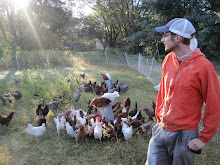Your local maniac farmer is about to rant. Make sure you're holding on to something...
It never fails. We're at the farmers' market. It's a beautiful day and all our friends (we like to call them co-producers) are coming out to support us, their local farmers, with cash money in exchange for wholesome goods like pastured eggs, pastured chicken, etc. We know their names, their families, how they like their eggs in the morning--intimate details of our lives are shared in these few hours on Saturday. But at every market there's at least one--a bed-and-breakfast owner, a chef, a caterer, or even a distributor who's heard about this idea of real, local food and thinks it would be good for their business. We chat for a while about our farm ethos, our production model, and other stuff until they get real excited and ask one question..."What's your wholesale price?"
"Well, we don't have a wholesale price."
And here's where our love affair begins to fall apart. You see, their expectation is that ordering in quantity should equal discount. It's not their fault, really--they're used to this paradigm, set up by Sysco and other purveyors of industrial food. But the clincher is that I'm not raising 100,000 crappy confinement chickens in a year. Quite the opposite--I run a small-scale, high quality operation from which I source my livelihood--and there's simply no room in my production model for wholesale pricing. I don't want to be the Wal-Mart of pastured poultry. Not to mention, if I sell them 40 dozen eggs or 40 chickens, that's about 40 families that I miss every Saturday.
And then there's that look that says it all...the "you must really rake in the dough" look. Quite the opposite, my friend. Many uneducated folks look at the higher prices associated with organic and sustainable agriculture as artificially inflated, but the fact of the matter is that the cost of production is high. For example, our broilers cost us about $9 to produce before our labor is factored in. When the average 3.5lb bird costs you, the co-producer, about $15.75 total, the remaining $6.75 for the 2 months of babysitting that went into raising that bird doesn't seem like much at all. That''s enough to make it worthwhile for us, but you can see there's simply not much wiggle room.
Of course this scares the dickens out of those chefs and other folks who wouldn't dream of, say, raising their own prices a little to account for the difference and provide wholesome, clean food to their patrons. Naturally the pastured poultry movement and the local, organic movement have tended to grow with direct farmer-consumer relationships and not middle men. And honestly, that's why we're in it. We believe in transparent, direct relationships where I know you, you know me, and that relationship benefits both of us. My relationship with you keeps me honest as a farmer and up to date with your gastronomic desires, and your relationship with me gives you front row seats to your food supply. Beyond that, our relationship benefits the local community (and I don't mean local like Florida and the Carolinas--local like Statesboro, Savannah, and Bluffton) in direct social and economic ways. Everybody wins. This exchange is the foundation upon which we stand, and upon which we continue to grow.
But lately there have been a few discouraging developments. When I heard there was a farm in Georgia that planned on wholesaling pastured poultry to a regional distributor, I arched an eyebrow. You see, I've met most of the pastured poultry producers in the state personally and not one of them goes through a distributor or provides a wholesale price. Call me crazy, but it just doesn't make sense economically, nor is it sustainable to produce chicken that's shipped all over creation when locally sourced production and distribution could provide jobs and nourishment to the local community. Additionally, producing on a large scale to provide a wholesale price skews the market's perception of costs for the small producer like me. In the end, the wholesale grower loses his shirt and I do, too, because my scale of production cannot fit the market's false expectations (established by the wholesale grower) of what my costs should be. We both lose.
Wouldn't it be money better spent if the larger producer charged a fair value for their product and used the additional money to employ aspiring farmers and not middle men? Wouldn't we be richer as a community if we formed more farmer-eater relationships?
The essence of the pastured poultry movement is not large scale production for shipment--even though the distributor may have a crunchy granola name, that's the model we're getting away from. The essence of this movement is much smaller. It's about people helping each other face to face in their own neighborhoods.
It's not about some Chef in Atlanta who says he's wanted to use truly local pastured poultry in his restaurant but didn't because, "it was too expensive." But now that so-and-so distributor is carrying a cheaper version from a farmer he'll never meet who's being paid unfairly and lives 3 hours away, he'll feel like he's doing the right thing.
So what do we do? We keep on building lasting relationships one handshake, one farm tour, one farmers' market at a time, telling the folks 'round the corner about what we do. As for the chefs, the caterers, the bed and breakfast owners? We accept they don't love us as much as you do, but we keep on challenging them to take a stand on their menu with truly local products. And when they finally come around--we'll be happy to receive them, and we'll tell all of you to eat their stuff, too.
By the way, these are the local businesses that proudly use our products. Eat their stuff, too:
The Sentient Bean, Savannah, GA
Thrive Cafe, Savannah, GA
The Herb Shop, Statesboro, GA
Chef Elaine & Elaine's Creations, Statesboro, GA
--Arianne

















